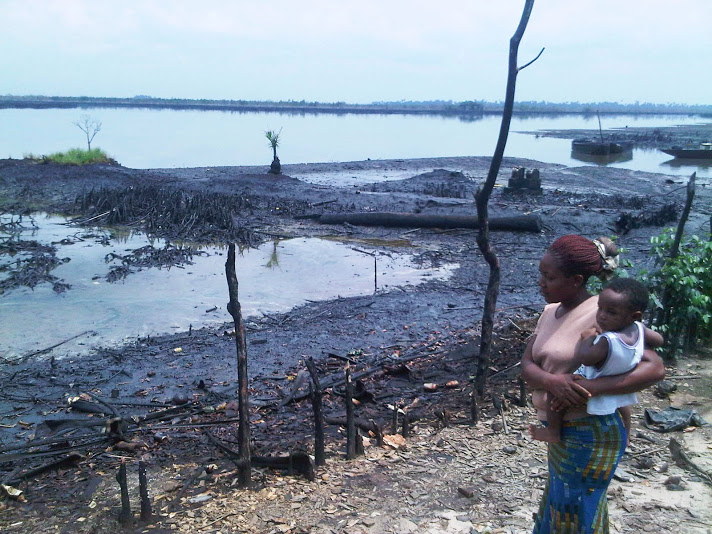A leading oil spill expert, previously employed by Shell Nigeria, has alleged that Shell is trying to conceal data on the potential health effects of its oil spills on the Bodo community in the Niger Delta.

Kay Holtzmann, who was previously employed by Shell to conduct the clean-up of the Bodo community in the Niger Delta, wrote a letter to the current chairman of the Bodo Mediation Initiative, which is sponsored by the Dutch Government and tasked with ensuring the clean-up of the Bodo Community to international standards.
A copy of the letter from Mr Holtzmann was also sent to Shell, the Executive Director of the United Nations Environment Programme (UNEP), Eric Solheim, and the Dutch Ambassador.
In the letter, Mr Holzman states that an analysis of the environment was conducted by the clean-up project in August 2015 of the Bodo creek against the “fierce opposition” of Shell Nigeria.
Mr Holtzman says in the letter: “The results from the laboratory were astonishingly high, actually the soil in the mangroves is literally soaked with hydrocarbons. Whoever is walking in the creeks cannot avoid contact with toxic substances. Although the locals are accustomed to their environment they are exposed to hazards and especially negative long term effects on their health are unpredictable.”
He claims that the results suggest the need for a “medical mass screening of the Bodo people” following their exposure to the highly dangerous hydrocarbons through bathing and drinking contaminated water.
He adds that he has requested permission from Shell Nigeria to publish the data which he believes is of public interest, but that, according to Mr Holtzmann, they have flatly refused.
He makes clear in the letter that it is his view that Shell Nigeria is behaving “irresponsibly” and has “no right to conceal important data”, however unpleasant.
Law firm Leigh Day, who secured £55 million in compensation for residents of the Bodo Community in 2015, was sent a copy of the letter and wrote to Shell on behalf of the community on January 30, 2017, seeking urgent clarification and disclosure of the data.
In addition, Leigh Day requested that Shell put in place the necessary health screening measures forthwith. No response to that letter has been received, the firm adds.
Daniel Leader, Partner at Leigh Day who is representing the Bodo Community, said: “The Bodo Community was subjected to two devastating oil spills due to faults on Shell’s pipelines in 2008. These spills led to the largest loss of mangrove habitat in the history of oil spills and ruined Bodo’s environment and way of life.
“Leigh Day has been pushing for the clean-up of Bodo, health screening of the population and testing of the water supply since 2011 – all to no avail. This letter shows that even those who were employed by Shell are deeply concerned by their behaviour and their lack of transparency. Shell must act now.”
Leigh Day represents the Bodo Community in the Niger Delta, a rural coastal settlement consisting of 31,000 people who live in 35 villages. Most of its inhabitants are subsistence fishermen and farmers.
In 2008, two oil spills from Shell’s pipelines devastated the environment surrounding the community of Bodo, in Gokana Local Government Area, Rivers State, Nigeria. The volume of oil spill was estimated by experts to have been in excess of 500,000 barrels. The oil caused what is believed to be the largest loss of mangrove habitat ever caused by an oil spill.
In 2011, Shell admitted liability for the spills but initially only offered the Community £4,000 in compensation. The compensation claims on behalf of the Community were eventually settled for £55 million in 2015.
Until the 2008 spills Bodo was a relatively prosperous town based on fishing. According to the claimants’ lawyers, the spills have destroyed the fishing industry. They claim Shell failed to speedily compensate the people of Bodo and delayed and prevaricated for years in the face of overwhelming evidence. However, the clean-up of the 2008 oil spills has still not commenced.
The United Nations, Amnesty International and the Nigerian government have all expressed reservations with Shell’s environmental record in the region.
The United Nations Environment Programme’s Environmental Assessment of Ogoniland 2011 appears to back up these findings. It surveyed pipelines and visited all oil spill sites, including the Bodo creek. It found Hydrocarbon contamination in water in some sites to be 1,000 times higher than permitted under Nigerian drinking water standards and recommended a comprehensive clean-up of Ogoniland.
However, six years after the UNEP report, no action seems to have been taken, apparently leaving the communities with the option of seeking justice in foreign courts.
